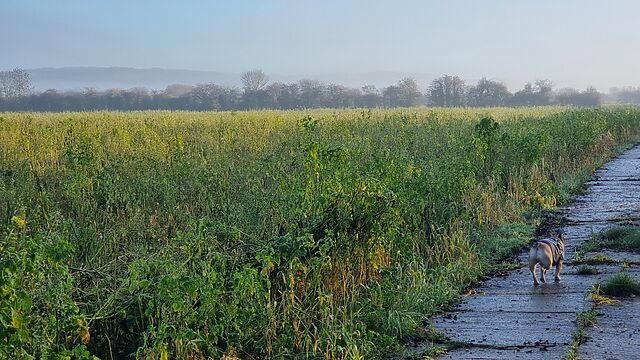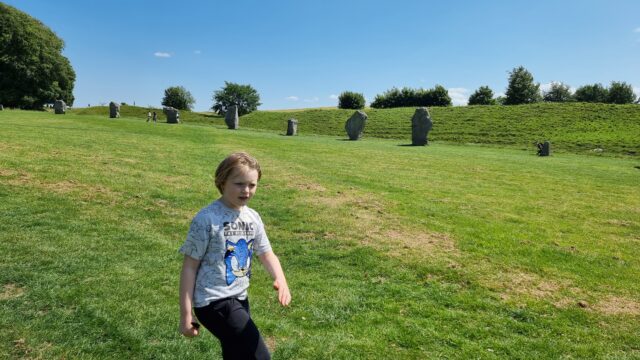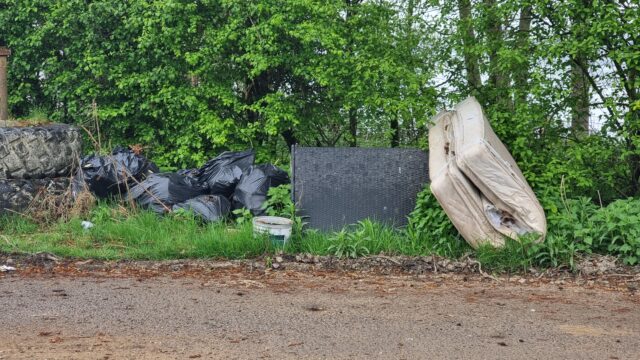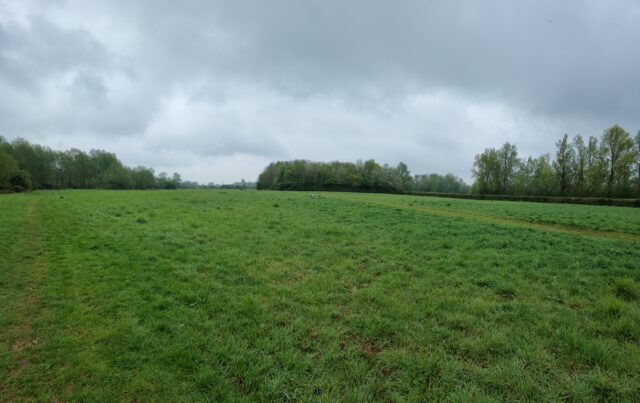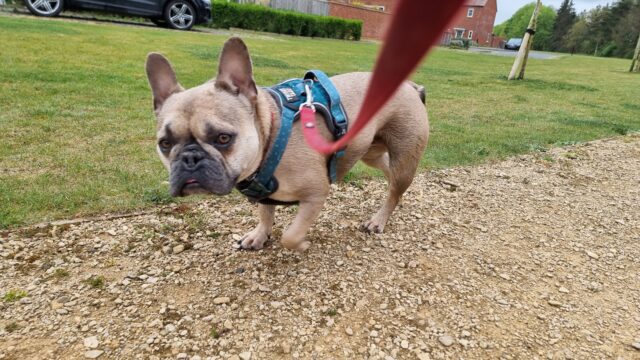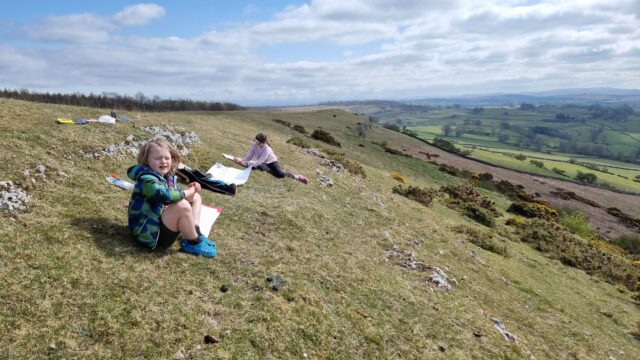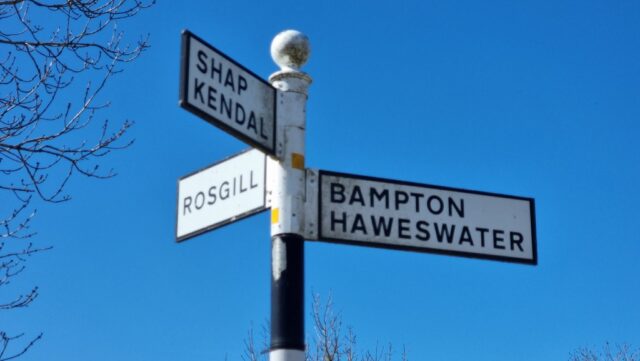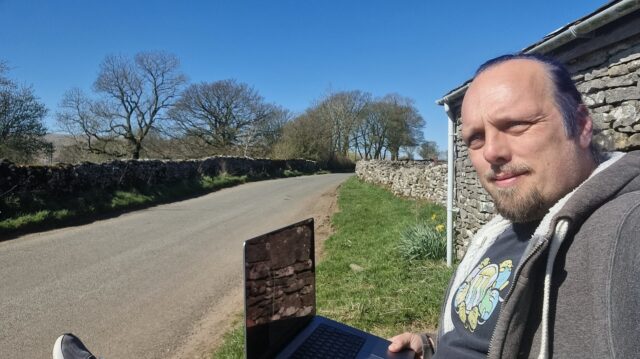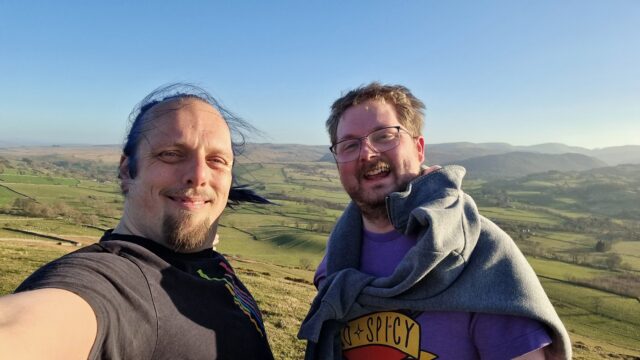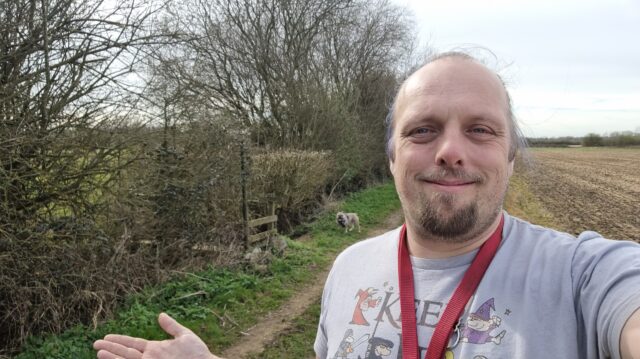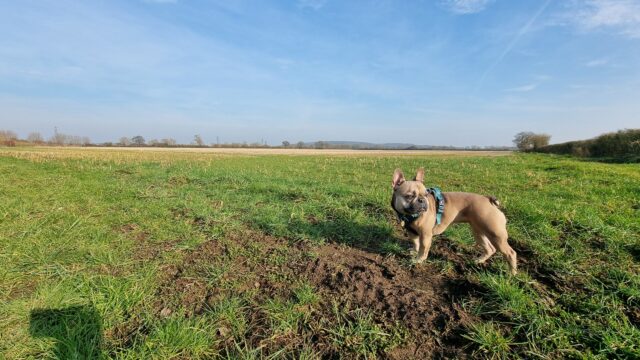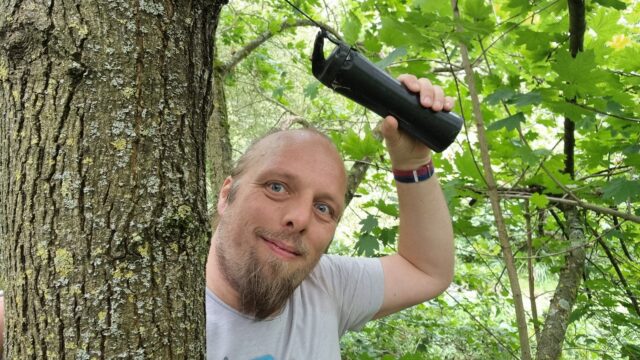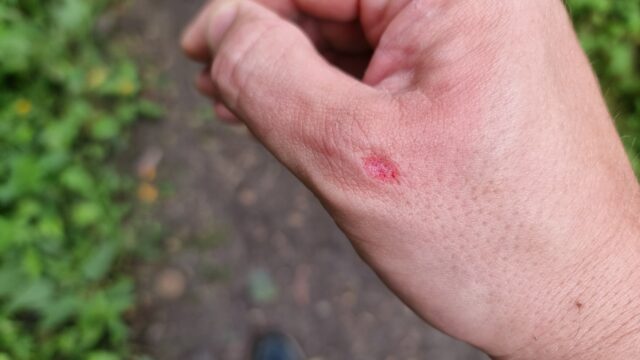A few pockets of the morning’s freezing fog still cling to the hedgerows as the dog and I set out on a chilly West Oxfordshire morning walk.
Tag: walking
Rabbithole
Hotdog Among the Trees
As the UK’s heatwave continues, the dog and I were delighted that this morning was sufficiently overcast that we could manage a proper walk without completely melting.
Her breed copes badly with the heat and we’ve lately had to keep her indoors or in the shade more than she’d like, so a chance to run around among the trees was very welcome!
Note #26759
Dan Q found GCB61ZC Mossy
This checkin to GCB61ZC Mossy reflects a geocaching.com log entry. See more of Dan's cache logs.
Saw GCB61ZC “Mossy” appear yesterday, but I’d already had an Easter Sunday beer or two and couldn’t drive out here… in fact, I realised, I probably wasn’t in a state to cycle out here either and so I resolved that I’d come out the following morning – that is, today – by car and give the dog a walk while finding GL1E5FYX0 and its year-older sibling GCAR5HV “Ivy”.
But early this morning the dog had been poorly and was still needing to relieve herself with little to no notice, so I didn’t want to risk putting her in the car! Though… I did want to keep her outdoors! It was time for a change in plan: instead of driving to near the cache then taking a walk… we’d attempt the whole thing on foot, perhaps taking the opportunity to explore some of the back footpaths that we’d not yet had a chance to try. We’d now missed our chance for the FTF at “Mossy”, but we could still enjoy a walk (and hopefully give the dog a chance to feel better).
We cut through fields at Sutton, past The Fox and Blackditch Farm, to brush against the side of Lakeside Industrial Estate and head down Dix Pit. After a brief pause to report fly tipping at 51.745311, -1.412871 (why would anybody fly tip literally just down the road from the recycling centre? it boggles my mind), we decided to duck off the road and take the parallel public footpath for a bit (OSM Way #204829432, trailhead 51.742330, -1.416563).
To our surprise, the public footpath was fenced off. I thought we might instead be able to take the track to the West and intersect with the nearby bridleway (OSM Way #1129092587) but it was marked as private, so we continued down Dix Pit. How DOES one get to that bridleway, I wondered? Just out of curiosity we tried to join it via the footpath (OSM Way #1129092588) at 51.737047, -1.412766, but it, too, lacked a usable gate (and looked severely overgrown!), although the public footpath signs within the mess were still visible. I suspect that this public footpath has been long neglected by the landowner and is quickly becoming lost to the world.
Instead, then, we passed Cutmill Farm and took the footpath through the woods that straddle the boundary line between Stanton Harcourt and Standlake, crossing the Windrush at a bridge that seemed to serve as the meeting point for a great multitude of dog walkers. My geopup, who’s not always the friendliest with new dogs, enjoyed greeting a few of them while warily watching the others.
We looped around Oxlease Lake in a clockwise direction, crossed Standlake Brook (the dog was very keen to get a drink of water, and in trying to do so made herself exceptionally muddy), and began working our way up the long driveway past the swimmers and anglers and sailors assembling and preparing for their bank holiday activities. I recalled that I’d been up this way about a year ago to find GCAQJN1 “Hardwick park 1”: I got the FTF on that, but it proved to be a short-lived cache, getting retired only three or four months later when park owners cut back the trees that had been its host. But I’d actually been here much earlier, too – over a decade ago – long before I moved to the local area, to find the much-more long-lived GC1TPFY “Constellations 4”. Strange to hunt for caches in places that I’ve walked past at least twice before, before those caches were hidden!
First up was “Mossy” (GCB61ZC). The dog – who was by now feeling herself again and happy to lead the way – struggled with the narrow kissing-gate to get onto the trail (she’s not so bright and doesn’t understand that she needs to make room for me to join her before I can open the gate) but soon we were on the path. The hiding place leapt out at me and soon the cache was in hand, the log signed (right behind Mad H@ter, whose Leafield series I was just attempting five days ago), and the cache returned to its hiding spot beneath its excellent camoflage. I hope the container survives the winter rains!
Second was “Ivy” (GCAR5HV): a brief walk through the holiday park away (via a glance at the watersports centre, which by the looks of things have paddleboards for rent: I first tried paddleboarding on the sea and figure it might be easier on a lake, so perhaps I’ll find an excuse to come down here and have a go at some point). The host was easy to find, but it took some searching to put my hand on the container because I started at the “wrong” side. It looks like it’s had (unlogged?) maintenance done since BusyLittleGeo’s visit last week: the cache was in perfect condition and the logbook was empty.
Now it was time to return home and give this happy (but mucky) dog a bath. We retraced our steps until Dix Pit, but then cut through the Devils’ Quoits and out through Hayfield Green to return to Stanton Harcourt, and from there picked our way back through the fields at Sutton to return home.
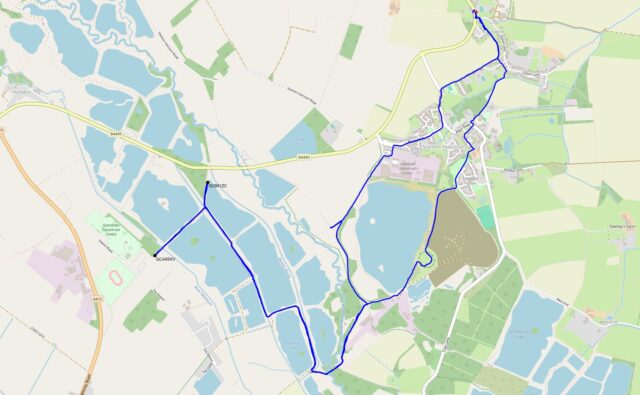
What could have been a 10-minute cache-and-dash became a 3-hour backwoods hike. Which might have been just what I (and a recovering dog) needed. TFTC.

Lake District art lesson
Rosgill Crossroads
I’m in an extremely rural area and I needed a phone call with my lawyer about my recent redundancy. Phone signal was very bad, so I resolved to climb a nearby hill and call him back.
“I’m at a crossroads,” I said, when I finally found enough bars to have a conversation with him.
“In your life?” he asked.
“I guess,” I replied, “But also, y’know, literally.”
Note #26262
The phone signal is so shit at this year’s 3Camp venue that I’ve had to climb a hill to take a call from a lawyer (whom I’m speaking to about my recent redundancy). Nice to be outdoors, though!
Dan Q found GC1DH7W Knipe Scar – On the Edge
This checkin to GC1DH7W Knipe Scar - On the Edge reflects a geocaching.com log entry. See more of Dan's cache logs.
A swift uphill scramble for my friend and fellow volunteer John and I, before dinner. We’re staying in a nearby farmhouse for a week of volunteer work, writing software to help charities. Beautiful view from the summit this evening! SL, TNLN, TFTC!
Istanbul decompression
It wasn’t until I made time for myself to get out into the countryside near my home and take the dog for a walk that I realised how much stress I’d been putting myself under during my team meetup, this week.
Istanbul was enjoyable and fascinating, and I love my team, but I always forget until after the fact how much a few days worth of city crowds can make me feel anxious and trapped.
It’s good to get a mile or two from the nearest other human and decompress!
OpenStreetMap rocks (especially on foot)
Especially outside of urban centres, and especially if you’re on foot, OpenStreetMap is way better than Google Maps, Bing Maps, Apple Maps, or what-have-you.
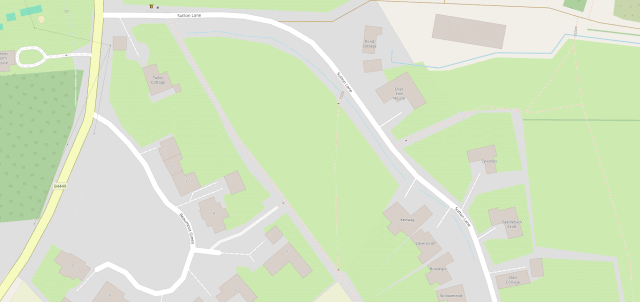
OpenStreetMap is especially good for walkers, with its more-comprehensive coverage of public footpaths as well as the ability to drill-down for accessibility information: whether a path ends in a gate or a stile matters a lot if you can’t climb the latter (or you’re walking with a small-but-muddy dog who’ll need lifting over).
Sure, you don’t get (as much) street view photography. But how often do you use that, anyway?1
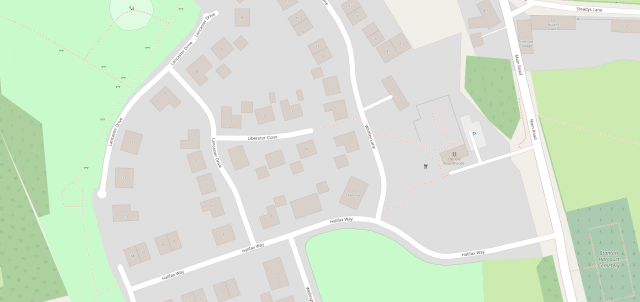
I’ve heard it argued that OpenStreetMap, with its Wikipedia-like “anybody can edit it” model, cannot be relied upon. And sure, if you’re looking for an “official” level of accuracy and the alternative is an Ordinance Survey map, then that’s what you should go for.
But there’s nothing specific to, say, Google Maps that makes it fundamentally more “accurate” for most2 geographic features than OpenStreetMap. The vast of cartographic data on Google Maps is produced by humans, looking at satellite photos, and then tracing the features on them, probably with AI assistance. And the vast majority of cartographic data on OpenStreetMap is produced… exactly the same way, although without the AI “helping”.
Google Maps has mistakes, just like every map3. And it’s got trap streets, like most commercially-produced maps (including the Ordinance Survey). Google Maps’ mistakes tend to be made by somebody on the other side of the world from the feature, doing a bad job of tracing what they think might be a road… while OpenStreetMaps’ mistakes are for the most part omissions in areas that are under-explored by local contributors. And there are plenty of areas – like those near where I live, especially if you’re on foot – where the latter mistakes are much less-troublesome.
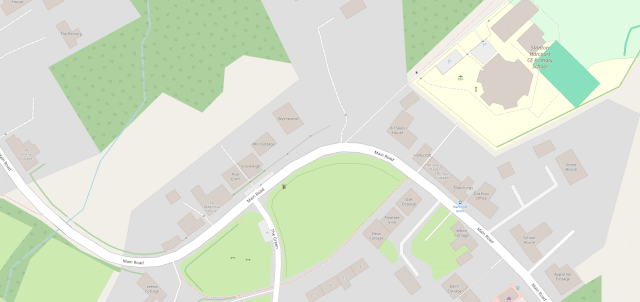
I fixed a couple of omissions on OpenStreetMap just earlier today. While I was out walking the dog, earlier, I added the names of two houses whose identities weren’t specifically marked on the map, and I added detail to the newly-constructed Deansfield estate. Google Maps shows there being only two houses on Deansfield Estate, among other inaccuracies, even though they’ve got up-to-date aerial and street photography.
Google Maps is fine if you want to drive to Sheffield, you need public transport connections to Plymouth4, or you’re looking for a restaurant nearby and you want the data about them to be accurate. But next time you’re walking somewhere, or when you’re looking for a specific address… I’d suggest you give OpenStreetMap a go. You might be pleasantly surprised.
Footnotes
1 I say that as somebody who uses street view and satellite photography a more than average amount, for geohashing purposes. But I can switch mapping software on-the-fly; nobody’s stopping me looking at “ostrich” photos when I need them.
2 The place that Google Maps really beats OpenStreetMap, in my mind, is in the integration of its business directory. If you search for a business in Google Maps, you’ll probably find it and get reasonably-accurate opening hours and contact details. But that’s a factor of two things: the Google My Business directory, and – more importantly – the popularity of the application and the fact that the mobile app “nudges” people to check on the places around them. By the way: if you want to contribute to making maps better in that way without becoming an unpaid researcher working to line Google’s pockets, StreetComplete is an app that helps fill-out business and related information on OpenStreetMap!
3 Google Maps used to show Vauxhall tube station on entirely the wrong side of the River Thames, for example.
4 Public transport’s another thing Google Maps does very well.
Spring is coming
Yr Wyddfa’s First Email
On Wednesday, Vodafone announced that they’d made the first ever satellite video call from a stock mobile phone in an area with no terrestrial signal. They used a mountain in Wales for their experiment.
It reminded me of an experiment of my own, way back in around 1999, which I probably should have made a bigger deal of. I believe that I was the first person to ever send an email from the top of Yr Wyddfa/Snowdon.
Nowadays, that’s an easy thing to do. You pull your phone out and send it. But back then, I needed to use a Psion 5mx palmtop, communicating over an infared link using a custom driver (if you ever wondered why I know my AT-commands by heart… well, this isn’t exactly why, but it’s a better story than the truth) to a Nokia 7110 (fortunately it was cloudy enough to not interfere with the 9,600 baud IrDA connection while I positioned the devices atop the trig point), which engaged a GSM 2G connection, over which I was able to send an email to myself, cc:’d to a few friends.
It’s not an exciting story. It’s not even much of a claim to fame. But there you have it: I was (probably) the first person to send an email from the summit of Yr Wyddfa. (If you beat me to it, let me know!)
Dan Q found GC4PYCF Thames Path – Floodproof
This checkin to GC4PYCF Thames Path - Floodproof reflects a geocaching.com log entry. See more of Dan's cache logs.
Excellent cache, which I was pleased to observe has the largest conceivable container possible for its hiding place: nice one! I love a good treetop cache!
Once I’d free the right tree, getting up was relatively easy: the limb next over from the one mentioned in the hint provided a good launching-off point and a short scramble later I was sat at height with the container in hand. Getting down, though, proved more challenging as I slipped on a low bough and plummeted to the ground!
Aside from my pride, the biggest injury was to my thumb, which nicked some kind of fierce plant on the way down and is bleeding as I type this. Still 100% a worthwhile effort to find a great cache, so an FP awarded.
Now I’ve gotta start jogging again if I’m to have any chance of catching up to my partner Ruth, who I’ve joined in this leg of her effort to walk the entire Thames Path (I swear I didn’t just agree to tag along for the caching opportunities!).
Dan Q found GC8NW44 Thames Path – 91-DIVOC
This checkin to GC8NW44 Thames Path - 91-DIVOC reflects a geocaching.com log entry. See more of Dan's cache logs.
Not convinced they my route through the 2m nettles to reach the host was optimal, but I made it through to this decent sized cache relatively unscathed. TFTC!
